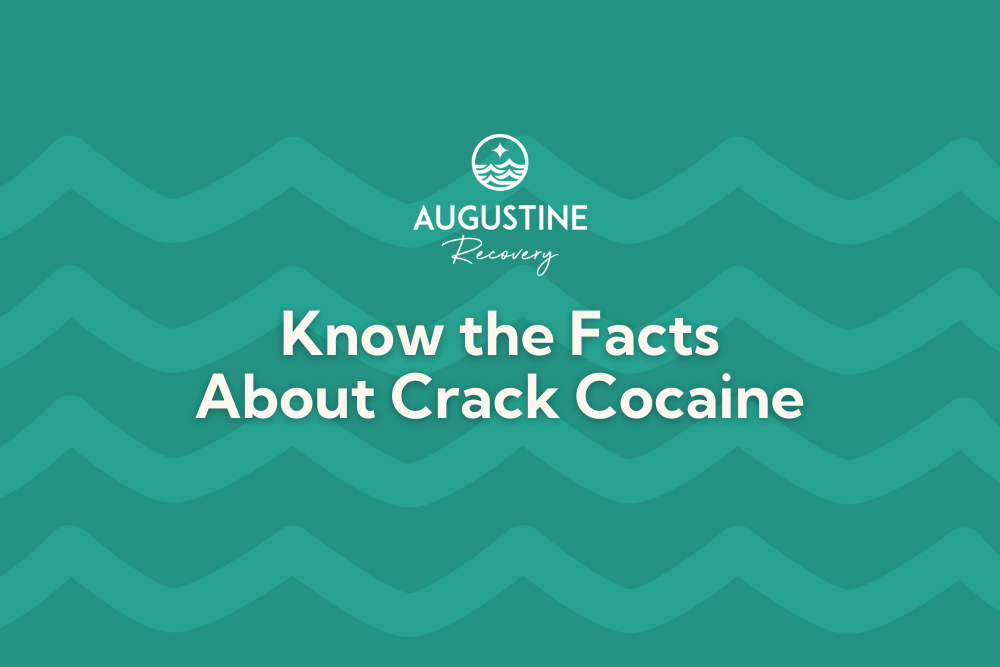Crack cocaine is considered a “serious threat to Florida,” according to the National Drug Intelligence Center (NIDC). Criminal groups, gangs, and individual dealers create and distribute this drug throughout the state. To measure the impact of this substance, the Medical Examiners Commission of the Florida Department of Law Enforcement analyzed drug-related deaths in 2020.1 Cocaine was involved in over 1,800 fatalities, ranking just behind fentanyl, alcohol, and benzodiazepines. Today, we’ll answer a few questions we often hear from families: What is crack cocaine? Is it dangerous? If so, how do I help my loved one get treatment?
What is Crack Cocaine?
Crack cocaine is a powerful, addictive stimulant drug that rose to popularity in the 1980s. It is produced in clandestine labs, where drug dealers dissolve powdered cocaine into a mixture of water and another substance. This process produces hard chunks of potent cocaine that may be white or off-white in color. These “rocks” are then smoked in an attempt to gain a quick high. However, the dangers of this substance cannot be overstated.
Dangers of Crack Cocaine Use
In-the-moment effects of crack include hyperactivity and inflated confidence. If your loved one is on this drug, they might say or do things they wouldn’t normally even entertain. You’ll observe that their pupils have dilated, and they can’t seem to stop moving. While these symptoms may be unsettling, they are nothing compared to the lifelong impact of chronic crack cocaine use. These include:
Organ damage. Smoking crack cocaine damages most of a person’s major organs, including the lungs, liver, heart, and kidneys. It’s not uncommon for those addicted to this drug to suffer from strokes, heart attacks, kidney failure, and reproductive issues.
Weakened immune system. People who use cocaine are at higher risk for infections. This is because ongoing substance use negatively affects one’s immune system. As such, a person on crack cocaine may find themselves dealing with unhealing abscesses that require medical attention.
Mental health effects. The brain is an organ, and therefore can be damaged by crack cocaine. Prolonged substance use dramatically changes the way the brain works. Psychotic episodes – seeing and hearing things that aren’t there – may begin to manifest as one’s addiction deepens. Paranoia, high-risk behavior, and aggression are also considered risks of long-term cocaine use.
Legal issues. Cocaine is illicit in any form, and unfortunately, those in possession of crack cocaine have historically received far harsher sentences than those with powder on their person. While mandatory minimums have been addressed in recent years,2 using or distributing crack is associated with serious legal problems. Florida Statute § 893.03 classifies this substance as a Schedule II drug3 and possessing less than 28 grams can result in felony charges, 15 years in prison, and a $10,000 fine.
Addiction. Crack is considered one of the most addictive drugs in the world. The dopamine generated by smoking this substance begins to change the brain from the first encounter. Repeatedly using crack cocaine creates a physical and psychological dependence. In many cases, a person will need professional help to break the cycle of obtaining, using, and recovering from this drug.
Help for Addiction in St. Augustine, Florida
If you are concerned about a loved one who has begun using crack cocaine, you are not alone. Augustine Recovery offers gender-specific treatment programs for women and men. Our North Florida rehab offers the evidence-based care and support needed to overcome a dependency on any addictive substance. Contact our compassionate admissions team to learn more about our approach to recovery programming.





